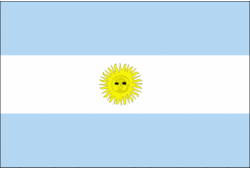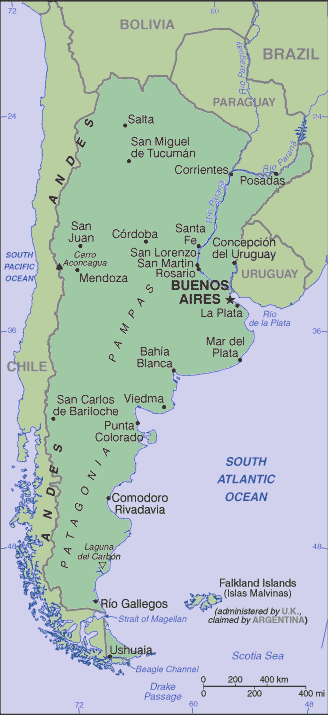Traveling Luck for Argentina. Argentina, South America
Argentina is located in Southern South America, bordering the South Atlantic Ocean, between Chile and Uruguay.
Land in Argentina is rich plains of the Pampas in northern half, flat to rolling plateau of Patagonia in south, rugged Andes along western border.
Argentine land covers an area of 2766890 square kilometers which is slightly less than three-tenths the size of the US
Argentina has borders with Bolivia for 832km, Brazil for 1224km, Chile for 5150km, Paraguay for 1880km and Uruguay for 579km.
 Argentine national flag (Flag of Argentina)
Argentine national flag (Flag of Argentina)
As for the Argentine climate; mostly temperate; arid in southeast; subantarctic in southwest.
Argentine(s) speak Spanish (official), English, Italian, German, French.
Places of note in Argentina
- Buenos Aires
- Córdoba
- Rosario
- Mendoza
- San Miguel de Tucumán
- La Plata
- Mar del Plata
- Salta
- Santa Fe
- San Juan
- Resistencia
- Santiago del Estero
- Corrientes
- Posadas
- San Salvador de Jujuy
- Bahía Blanca
- Paraná
- Neuquén
- Formosa
- San Fernando del Valle de Catamarca
- San Luis
- La Rioja
- Río Cuarto
- Concordia
- Comodoro Rivadavia
- San Nicolás de los Arroyos
- Santa Rosa
- San Rafael
- Villa Mercedes
- Tandil
- San Carlos de Bariloche
- Trelew
- Villa María
- Reconquista
- Zárate
 Argentine map
Argentine map
Regions of Argentina
Following independence from Spain in 1816, Argentina experienced periods of internal political conflict between conservatives and liberals and between civilian and military factions. After World War II, a long period of Peronist authoritarian rule and interference in subsequent governments was followed by a military junta that took power in 1976. Democracy returned in 1983, and has persisted despite numerous challenges, the most formidable of which was a severe economic crisis in 2001-02 that led to violent public protests and the resignation of several interim presidents.
Argentina benefits from rich natural resources, a highly literate population, an export-oriented agricultural sector, and a diversified industrial base. Over the past decade, however, the country has suffered problems of inflation, external debt, capital flight, and budget deficits. Growth in 2000 was a negative 0.8%, as both domestic and foreign investors remained skeptical of the government's ability to pay debts and maintain the peso's fixed exchange rate with the US dollar. The economic situation worsened in 2001 with the widening of spreads on Argentine bonds, massive withdrawals from the banks, and a further decline in consumer and investor confidence. Government efforts to achieve a "zero deficit," to stabilize the banking system, and to restore economic growth proved inadequate in the face of the mounting economic problems. The peso's peg to the dollar was abandoned in January 2002, and the peso was floated in February. The exchange rate plunged and real GDP fell by 10.9% in 2002, but by mid-year the economy had stabilized, albeit at a lower level. GDP expanded by about 9% per year from 2003 to 2005. Growth is being led by a revival in domestic demand, solid exports, and favorable external conditions. The government boosted spending ahead of the October 2005 midterm congressional elections, but strong revenue performance allowed Argentina to maintain a budget surplus. Inflation has been rising steadily and reached 12.3 percent in 2005.
Argentine natural resources include fertile plains of the pampas, lead, zinc, tin, copper, iron ore, manganese, petroleum, uranium
second-largest country in South America (after Brazil); strategic location relative to sea lanes between the South Atlantic and the South Pacific Oceans (Strait of Magellan, Beagle Channel, Drake Passage); Cerro Aconcagua is South America's tallest mountain, while Laguna del Carbon is the lowest point in the Western Hemisphere
Argentine religion is nominally Roman Catholic 92% (less than 20% practicing), Protestant 2%, Jewish 2%, other 4%.
Natural hazards in Argentina include San Miguel de Tucuman and Mendoza areas in the Andes subject to earthquakes; pamperos are violent windstorms that can strike the pampas and northeast; heavy flooding.
Travel Advice for Argentina
ArgentinaSUMMARY
- Around 50,000 British nationals visit Argentina every year. Most visits are trouble-free. The main type of incident for which British nationals require consular assistance in Argentina is for replacing lost and stolen passports. You should keep a close eye on your personal belongings and hold on to them in public places such as internet cafes, and train and bus stations where distraction thefts commonly occur.
- There are occasional outbreaks of social unrest. You should avoid demonstrations.
- You should not become involved with drugs of any kind. Possession of even very small quantities can lead to a minimum four and a half years sentence.
- You should be aware that health and safety standards may not be as rigorously enforced as in the UK.
- The threat from terrorism in Argentina is low. But you should be aware of the global risk of indiscriminate terrorist attacks which could be against civilian targets, including places frequented by foreigners.
- We strongly recommend that you obtain comprehensive travel and medical insurance before travelling. You should check any exclusions, and that your policy covers you for the activities you want to undertake. Please see: Travel Insurance.
SAFETY AND SECURITY
The most frequent problems involve distraction theft, bag snatching and armed robberies in the street, in taxis and restaurants. Distraction thefts commonly occur in public areas such as Internet cafes, and train and bus stations. You should keep a close hold on your personal possessions and bags. Con men have also robbed tourists while an accomplice pretends to help remove ketchup or mustard which has been "accidentally" sprayed on them. Another common occurrence is the slitting of handbags in crowded places. Be particularly attentive in popular tourist areas, such as San Telmo. You should avoid carrying too much cash or wearing ostentatious jewellery.
Kidnappings and so called “express kidnappings” – short-term, opportunistic abductions, aimed at extracting cash from the victim – do occur in Argentina. Victims of express kidnapping are normally selected at random and held while criminals empty their bank accounts with stolen cash cards. Once the ransom is paid the victim is usually quickly released. Although tourists are not currently targeted, you should be alert at all times.
When travelling on local buses and trains, remain alert at all times. Pickpockets are rife. If you are robbed, you should inform the local police – a police report will be required by your insurers and by the Embassy if you need a new passport. In Buenos Aires, a 24-hour police helpline in English has been opened, on telephone number 101, to help victims. There is also a new multi-lingual free phone number for tourist assistance: 0800 999 5000. This goes through to the Tourist Police Station.
Passports should be left in a hotel safe/security box except when being used for identification purposes e.g. expensive purchases, cashing travellers cheques. Keep a photocopy of the details page of your passport with you at all times. Passports are required as identification for internal flights.
Political Situation
Despite a strong recovery, the economic and political crisis of 2001/02 has left its mark, particularly in the form of increased inequality and poverty. With around 35% of the population living below the poverty line, there are occasional outbreaks of social unrest and demonstrations, which at times turn violent. You are advised to be alert, avoid demonstrations and public gatherings, watch the news and keep in touch with events. You may also encounter groups of demonstrators (piqueteros) blocking major roads into and out of the capital, causing delays and possibly a change in route.
Argentina Country Profile
Road Safety
There is no reason not to travel by road throughout Argentina. But you should be aware that driving and road safety standards are not uniform: respect for speed limits and traffic signals is patchy and manoeuvres by fellow road users can be unexpected. Crime against car users, particularly when stationary at traffic lights, is a problem. You should keep windows closed and doors locked at all times whilst travelling in major cities.
Care should be taken when driving in the Province of Misiones close to the frontiers with Paraguay and Brazil. The area is used to smuggle goods across the borders. It would be advisable to seek local advice if driving in this area.
LOCAL LAWS AND CUSTOMS
ENTRY REQUIREMENTS
Single parents or other adults travelling alone with children should be aware that some countries require documentary evidence that both parents have given permission for the journey before allowing lone parents to leave the country. For further information on exactly what will be required at immigration, please contact the Argentine Consulate in London (contact details as above).
HEALTH
GENERAL
ATM (Automatic Teller Machines) availability is generally good but you should not rely solely on using international debit cards bearing the cirrus logo to access funds. You are advised, therefore, to ensure you carry alternative forms of payment, including a credit card (accepted in most hotels and major shops and restaurants) or travellers’ cheques, although the latter are not always accepted. US dollars are not widely accepted outside the major tourist areas for cash transactions but it is worth bringing a small supply of dollars to exchange for pesos. When exchanging money, you are advised to use only authorised bureaux de change, rather than informal traders.

 Search
Search Argentina country profile
Argentina country profile Travel advice for Argentina
Travel advice for Argentina